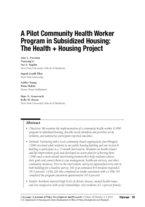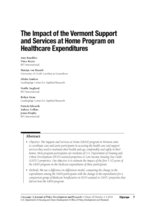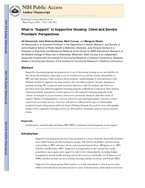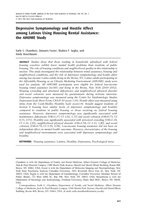Found 30 resources.
0
0
0

When applications opened for New York City’s first affordable housing property for LGBTQ older adults recently, 1,000 people eagerly sent theirs in on that first day.
Topics: East Coast, Homelessness, Housing, Low-income, Seniors
 Shared by Housing Is
on Jun 13, 2019
Shared by Housing Is
on Jun 13, 2019 0
0
0
For more than 85 tenants who call the Mercantile Wharf building home, the future looked dire. The owner of the historic North End building announced they could opt out of a subsidized-housing program, which would allow the landlord to get more than double the rent at market rate — and effectively forcing the low and moderate income residents to move.
Topics: East Coast, Housing, Mobility
 Shared by Housing Is
on May 23, 2019
Shared by Housing Is
on May 23, 2019 0
0
0

For 17 years, physicians, nurse practitioners and pediatric residents at our hospital, and presently, at more than 80 locations throughout the region, have been participating in Reach Out and Read of Greater Philadelphia (www.reachoutandreadphilly.org), a simple yet profound way to harness the power of a book to potentially alter a child’s health trajectory.
Topics: Early childhood, East Coast, Education, Grade-level proficiency, Health, Literacy, Low-income
 Shared by Housing Is
on Apr 18, 2019
Shared by Housing Is
on Apr 18, 2019 0
0
0
More than 20,000 African American residents were displaced from low-income neighborhoods from 2000 to 2013, researchers say.
Topics: East Coast, Housing, Low-income, Racial inequalities
 Shared by Housing Is
on Mar 19, 2019
Shared by Housing Is
on Mar 19, 2019 0
0
0
What is source of income discrimination, and who are the Rhode Islanders affected by it? The federal Fair Housing Act prohibits housing discrimination on the basis of race, color, religion, national origin, familial status, sex, and disability. Rhode Island state law goes further, granting residents additional rights. Yet both still allow landlords to reject a prospective tenant based solely on where his or her income comes from, even when the applicant can lawfully pay the requested rent.
Topics: East Coast, Housing, Low-income, Racial inequalities, Research
0
0
0
Baltimore is the 30th-largest US city by population and is a study in contrasts. It has a low average income compared with other wealthy Northeast cities, has nine colleges and universities, and is a magnet for people pursuing higher education but has undergone decades of population loss. A large social sector provides important services to residents and buoys the local economy: nearly every third job in the city is with a nonprofit employer. But this also illustrates the city’s limited economic vibrancy. This mix of market and nonmarket forces makes Baltimore an important place to examine...
Topics: Community development, East Coast, Housing, Low-income, Racial inequalities, Research
 Shared by Housing Is
on Feb 14, 2019
Shared by Housing Is
on Feb 14, 2019 0
0
0
This research brief explores how access to rental assistance affects the self-management behaviors of people with type 2 diabetes. Through semi structured interviews with 40 low-income residents of New Haven, Connecticut, diagnosed with type 2 diabetes, researchers analyzed the effects of housing stability and affordability on their self-care routines.
Topics: East Coast, Health, Homelessness, Housing, Low-income, Research
 Shared by Housing Is
on Jan 24, 2019
Shared by Housing Is
on Jan 24, 2019 0
0
0
On Wednesday afternoon, Durant — back home as Golden State prepared to play the Washington Wizards on Thursday night — made his way southeast, back to the old neighborhood, to appear at the grand opening of College Track at the Durant Center, whose location the Suitland native selected largely because it’s next door to that familiar McDonald’s. The after-school program, whose inaugural class includes 69 students largely from low-income families, provides study space and guidance not only through college enrollment but through graduation.
Topics: East Coast, Funding, Low-income, Out-of-school time, Place-based, Post-secondary, Youth
0
0
0

A D.C. housing development serves as a refuge for grandparents raising young children. Is it a model for the rest of the country?
Topics: Child welfare, Dual-generation, East Coast, Family engagement, Low-income, Place-based, Seniors, Stability, Youth
0
0
0
Massachusetts Attorney General Maura Healey on Tuesday announced $3 million in grants to 13 community organizations that address things like housing, hunger and other societal factors that affect someone’s health.
Topics: East Coast, Food insecurity, Health, Housing, Low-income, Nutrition, Partnerships, Preventative care
 Shared by Housing Is
on Jan 16, 2019
Shared by Housing Is
on Jan 16, 2019 0
0
0

Island School is one of 247 “community schools” in New York. These are regular public schools, with a twist. They have longer days and longer school years: Island stays open 12 hours a day, six days a week, including spring and winter breaks as well as the summer. A psychologist makes weekly rounds. A dentist comes by regularly. So does an optometrist, and students who need glasses get them free.
Topics: Community development, Dual-generation, East Coast, Education, Family engagement, Homelessness, Housing, Low-income, Mental health, Metrics, Partnerships, Stability, Youth
0
0
0

When schools started back up this fall, many across the country witnessed something that’s become as common on the first day as new backpacks and freshly sharpened pencils: another surge of homeless and housing-insecure schoolchildren.
Topics: East Coast, Education, Homelessness, Housing, Pacific Northwest, Partnerships, Transportation, Youth
0
0
0

Nearly 115,000 students in New York City schools experienced homelessness during the 2017–18 school year, according to new data released by the New York State Education Department (NYSED) last month. As reported by the New York Times, that figure represents 1 in 10 New York City public and charter school students. Our look at the data on noncharter public school students shows that even that alarming share hides the pervasiveness of student homelessness in some communities.
Topics: Child welfare, East Coast, Education, Homelessness, Housing, Low-income, Racial inequalities, Research, Youth
0
0
0
Does a screening requirement for homeless families seeking shelter create unintended costs? In 2012, Massachusetts passed a law requiring homeless families seeking shelter to prove that they had recently stayed somewhere not meant for human habitation. Hospital emergency department discharge paperwork can provide such proof. This study explored the trends of emergency department use for shelter by homeless youth before and after the eligibility criteria was passed into law and to measure the financial impact it had on the health care system. Researchers conducted a retrospective analysis of...
Topics: Cost effectiveness, East Coast, Health, Homelessness, Housing, Legislation & Policy, Low-income, Research, Youth
0
0
0

Many youth experiencing homelessness report avoiding shelters because they don’t feel safe there or can’t relate to the older adults, but they often don’t have another option. It’s a problem that many jurisdictions are working to correct, understanding that although homeless youth and homeless adults have similar needs, reaching these young people may require different spaces and different strategies.
Topics: East Coast, Education, Homelessness, Housing, Low-income, Metrics, Post-secondary, Safety, Youth
0
0
0
We examine the implementation of a community health worker (CHW) program in subsidized housing, describe needs identified and priorities set by residents, and summarize participant-reported outcomes.
Topics: East Coast, Health, Housing, Low-income, Partnerships, Place-based, Research
0
0
0
Emergency room visits for homelessness surged at a large urban children’s hospital after Massachusetts made it harder for families to get into shelters, a new study suggests.
Topics: Child welfare, East Coast, Health, Homelessness, Housing, Low-income, Research
0
0
0
Students have around 60 programs at their disposal, from advanced manufacturing to emergency medical response.
Topics: East Coast, Education, Food insecurity, Health, Low-income, Post-secondary, Youth
0
0
0

Nationally, resources for providing families with housing assistance are inadequate. DC is piloting a new approach, the DC Flexible Rent Subsidy Program (DC Flex), to test whether shallow (smaller than the average subsidy, over a defined period) and flexible subsidies can help more families maintain affordable, adequate housing.
Topics: Cost effectiveness, East Coast, Housing, Low-income, Research, Stability
0
0
0
This study draws on qualitative interview data to examine transitions into rent-assisted housing as they relate to diabetes self-management behaviors.
Topics: East Coast, Health, Homelessness, Housing, Low-income, Mental health, Metrics, Nutrition, Research, Stability
 Shared by Housing Is
on Aug 1, 2018
Shared by Housing Is
on Aug 1, 2018 0
0
0
We examine the implementation of a community health worker (CHW)
program in subsidized housing, describe needs identified and priorities set by residents, and summarize participant-reported outcomes.
Topics: East Coast, Health, Housing, Low-income, Mental health, Metrics, Partnerships, Place-based, Racial inequalities, Research
 Shared by Housing Is
on Aug 1, 2018
Shared by Housing Is
on Aug 1, 2018 0
0
0
The Support and Services at Home (SASH) program in Vermont aims
to coordinate care and assist participants in accessing the health care and support services they need to maintain their health and age comfortably and safely in their homes. Most program participants are residents of U.S. Department of Housing and Urban Development (HUD)-assisted properties or Low-Income Housing Tax Credit
(LIHTC) properties. Our objective is to estimate the impact of the first 5 1/2 years of the SASH program on the Medicare expenditures of these participants.
Topics: Cost effectiveness, Dual-eligibles, East Coast, Health, Home visiting, Housing, Legislation & Policy, Low-income, Medicaid / Medicare, Metrics, Seniors
 Shared by Housing Is
on Aug 1, 2018
Shared by Housing Is
on Aug 1, 2018 0
0
0
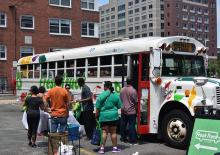
Health promotion interventions in public housing communities have the potential to reduce obesity among residents, a new study shows. Changes in their environment, such as fresh food trucks, walking groups, screenings, and cooking demos, helped Boston residents eat better and get more exercise.
Topics: East Coast, Exercise, Food insecurity, Health, Housing, Low-income, Nutrition, Obesity, Research
 Shared by Housing Is
on Jul 27, 2018
Shared by Housing Is
on Jul 27, 2018 0
0
0
Supportive housing programs are proposed as a way of increasing housing access and stability for the chronically homeless, improving access to needed services, and decreasing vulnerability to HIV and other diseases. Little is known about residents’ understandings of and experiences with different models of supportive housing and how they fit within residents’ broader strategies to maintain housing. We conducted semi-structured interviews with 23 residents and 10 service providers from nine different supportive housing programs in Hartford, Connecticut. Data analysis explored residents’...
Topics: East Coast, Homelessness, Housing, Mental health, Place-based, Research, Substance abuse, Supportive housing
 Shared by Housing Is
on Jul 23, 2018
Shared by Housing Is
on Jul 23, 2018 0
0
0
Studies show that those residing in households subsidized with federal housing vouchers exhibit fewer mental health problems than residents of public housing. The role of housing conditions and neighborhood quality in this relationship is unclear. This study investigated the relationship between rental assistance, housing and neighborhood conditions, and the risk of depressive symptomology and hostile affect among low-income Latino adults living in the Bronx, NY
Topics: Depression, East Coast, Health, Housing, Low-income, Mental health, Obesity, Racial inequalities, Research, Stability
 Shared by Housing Is
on Jul 11, 2018
Shared by Housing Is
on Jul 11, 2018 

